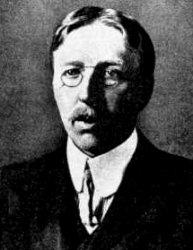Wednesday. Dinner at Ford Madox Hueffer's. John Galsworthy and wife there. Slight gene on my part on first encounter with Galsworthy, seeing my recent articles on him. However we did well together and he asked me to dinner. Hueffer said that Henry James dictated so slowly that he insisted on his amanuensis having a novel open before her to read while he dictated. He said that Conrad was still as late as ever with his copy.
The writer Ford Madox Hueffer, now known as Ford Madox Ford, was a prolific novelist, poet, critic, editor, and reminiscer. He is one of the most intriguing, versatile, and often still misunderstood of the great Modernist writers. He was brought up in London, the grandson of Ford Madox Brown, the painter closely associated with the Pre-Raphaelites. At the turn of the century he lived on the Romney Marsh, befriending Henry James and Stephen Crane, and beginning a ten-year collaboration with Joseph Conrad. In the years before the First World War he moved to London, where he founded the English Review, bringing together many of the best established writers of the day – James, Thomas Hardy, Conrad, H. G. Wells, and Arnold Bennett – with his new discoveries, many of whom would help redefine modern literature, such as Ezra Pound, Wyndham Lewis, and D. H. Lawrence. Ford’s best-known and most highly-regarded novel was The Good Soldier (1915). During the war he wrote propaganda; but in 1915 enlisted, serving in France in 1916-17 during the Battle of the Somme and at the Ypres Salient. He was invalided back to Britain in 1917, remaining in the army and giving lectures. After a spell recuperating in the Sussex countryside after the war, Ford lived mostly in France during the 1920s, first in Provence, then in Paris. He published his other major fictional work, the series of four novels known as Parade’s End, between 1924 and 1928. These were particularly well-received in America, where Ford spent much of his time from the later 1920s to his death in 1939.
I wonder at myself accepting Hueffer's invitation. Earlier this year he played a dirty trick on me by agreeing with Pinker to buy a short story of mine at a fraction of its worth. He told Pinker that I had originally agreed to do a serial and the short story was by way of some compensation for reneging on this agreement. A pack of lies presented as half-truths. I wrote to him to express my feelings and soon afterwards he invited me to dinner. I replied in sorrow that I could not come to dinner, as I considered that he had done me in the eye over the price of the short story. He wrote to ask me by how much I considered that he had done me in the eye. I answered by at least ten pounds. He sent me a cheque for ten pounds. I attended his dinner. Such is the way the world works.
All these days magnificent weather. East wind having gradually died down. Putney Bridge and High Street at 11 a.m. Talk about road to Delhi. "I met a hundred men on the road to Portsmouth and they were all my brothers" (Indian proverb).
Additionally for April 9th., see 'Parisian life'
Cornillier called yesterday morning, and I was telling him about a good early picture by Tissot that Ullman had bought for 200 francs. He said that a long time ago Tissot had a mistress, with whom he had continued relations for a considerable period. He decided to break the liaison, and he wrote one letter to his mistress, giving her the gentlest possible hint that the affair must ultimately come to an end, and another letter to an intimate friend, a man, saying brutally that he was sick of the thing and wanted to marry. he mixed the letters up, and the mistress received the wrong one. She committed suicide. Tissot was deeply affected, regarded himself as her murderer, and became devot. This was really the origin of his journeys to Palestine, and the ruin of his art.


No comments:
Post a Comment